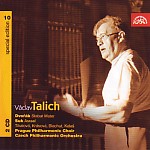If I had to choose any pair of performances that represent Václav Talich at his best, it probably would be these. He was a close friend of Josef Suk, and his recordings of Asrael and Ripening remain the benchmarks by which all others should be measured. He delivers an enormously gripping, high-impact performance of the Asrael Symphony here, characterized by magnificent playing from the Czech Philharmonic. The climaxes are thunderous, but the delicate moments in the second and third movements are played with exceptional sensitivity and a marvelous feel for the music’s light and shade. Sonically this always was very good for its day. Yes, it’s mono, but the balances are excellent, and at the end of the first movement the brass bray and the bass drum thuds terrifyingly, and the entire passage comes across with more impact and clarity than in some modern digital recordings (Belohlávek’s, for instance, on Chandos). In short, this is must-have Talich.
The same holds true of the Stabat Mater. The circumstances of Talich’s life in the early 1950s make this recording of Dvorák’s most sorrowful work particularly moving. After being falsely accused of Nazi collaboration (for which he was briefly imprisoned), his enemies in the new communist regime mostly forbade him to conduct the Czech Philharmonic. Only the occasional recording stands as a testimony to his legacy with the orchestra he had led for decades prior to the Second World War.
This performance is really splendid: the great choral exordium at the beginning (perhaps the most powerful extended choral lament since of the opening chorus of Bach’s St. Matthew Passion) is overwhelmingly moving. The Prague Philharmonic Choir sings fabulously, and the soloists (including legendary tenor Beno Blachut) were the best available. Happily, the engineering is just as fine as in the symphony, and both sound better than ever in these clean, honest transfers. Essential. [9/14/2006]
































